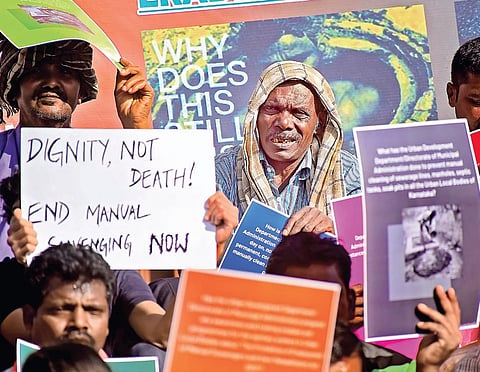

BENGALURU: Deaths of people due to manual scavenging are institutional murders and despite the loss of so many lives - 85 in Karnataka since 1995 - there have been no convictions, speakers at a protest over the recent death of a labourer death in a septic tank said here on Monday.
The All India Central Council of Trade Unions, Safai Karamchari Kavalu Samiti, Slum Janandolana, People’s Union for Civil Liberties and All India People’ Forum staged a protest at Town Hall on Monday demanding that the state government implement ensure the strict enforcement of the ban on manual scavenging and rehabilitate workers who are forced to do such work under The Prohibition of Employment as Manual Scavengers and their Rehabilitation Act, 2013.
“The death of Dalit sanitary workers while cleaning sewage lines, manholes, septic tanks and soak pits, without any machines or safety equipment is not an accident but institutional murder,” the protestors said in a press release.
Madhu, who worked as a manual scavenging for 33 years told The New Indian Express that he used to get Rs 1,200 to clean sewage chambers and sceptic tanks. “It is difficult. We deal with it by consuming alcohol before going in. We feel miserable the next day, once the effect of alcohol has worn off. Toxic gases fill our nose and mouth and it is tough to breathe. I did it to provide for my family and raise my daughter. I do not have any other skills or education.”
With the help of activists he now does odd jobs such as manual labour or sells petty items. It is not enough to look after his family, but he does not wish to return to manual scavenging. He demanded that the government help him find a decent job and a home.
“(Alcohol) is the only way to escape the horror of the job. My husband does it because he has nowhere else to go. We fear that we will lose our loved ones just the way we lost Siddappa,” said Rajeshwari, a street sweeper.
Siddappa died of asphyxiation while cleaning a septic tank in Shivajinagar on January 25.
“Despite the death of several people who were forced to handle human excreta with their bare hands (in septic tanks), there have been no convictions,” said activist Narasimhamurthy.
“The family usually does not have money to even reach a police station. They are scared of court processes, get threatened by the accused and give up. The police claim ignorance of the law and register weak cases favouring the accuse,” he added.
“The police can register a suo moto case, but do not do so. In Siddappa’s case, though the incident took place at 12.30 pm, the case was registered only at 8.30 pm after pressure from various civil society organisations and Dalit leaders,” said Narasimhamurthy, an activist.
list of demands
Special Investigation Team to investigate Siddappa’ death; arrest all accused
Legislative Committee to investigate manual scavenging and submit report in two months
Compensation of `1 crore in cases of deaths
Committee headed by retired HC Judge to review implementation of the Act
Record reasons for all acquittals, take action against investigating officers
Declare deceased workers martyrs, erect a memorial for them